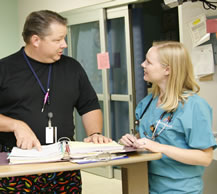The Pediatric Infectious Diseases Fellowship Training Program is based at Children's Hospital of The King's Daughters (CHKD) in Norfolk, Virginia. CHKD is the only full-service pediatric tertiary care facility in Southeastern Virginia, and serves a referral population in excess of 1.5 million. Thus, the institution provides a broad range of primary, secondary and tertiary care services to a variety of patients. The Pediatric Infectious Disease Service has approximately 175-200 inpatient admissions/year, provides approximately 300-325 inpatient consults/year, and has approximately 2000 outpatient visits/year. The Pediatric Infectious Disease Service actively participates in the education of Eastern Virginia Medical School students through both instruction in the basic Pediatrics rotation and student electives on the clinical and outpatient services. CHKD residents also receive education in Pediatric Infectious Diseases through care of the patients on the Infectious Disease Service and through either inpatient or outpatient electives. Supervision of students, residents and fellows is provided by full-time Pediatric Infectious Disease faculty. Research experience is provided through the Center for Pediatric Research. GoalsThe goals of the Pediatric Infectious Disease Fellowship Training Program are:
DescriptionThe Pediatric Infectious Disease Fellowship Training Program is 3 year program designed to provide balanced, organized and progressive exposure to clinical infectious disease practice and clinical and basic biomedical research through clinical care, consultative and research experiences under the direction of the program faculty. The first year is primarily devoted to gaining clinical experience and training through patient care. The second and third years focus on development of research skills. Supervised clinical experience (5 months inpatient, 5 months outpatient in the first year, ½ month inpatient and ½ month outpatient in each of the 2nd and 3rd years) in both the outpatient/ambulatory and inpatient environments is included. Research training and experience are emphasized for 22 months during the second and third fellowship years to develop effective pediatric physician-scientists. Diagnosis and management of pediatric infectious diseases is emphasized through direct patient care and consultative services. CurriculumClinical Training and ExperienceClinical training under supervision of Program faculty is the major emphasis of the first year. With increasing experience, the fellow is given more responsibility for clinical evaluation, diagnosis and management in both direct patient care and consultation services. Fellow competency in areas of patient care, medical knowledge, practice-based learning and improvement, interpersonal and communication skills, professionalism and systems based practice is the objective of this clinical training. Teaching TrainingThrough the duration of the fellowship, didactic instruction in basic concepts of microbiologic diagnosis, infectious disease management, infectious disease therapeutics, infectious disease prevention, immunology/host defense related to infectious diseases, infection control, epidemiology and statistics are given. Both weekly (Tidewater Infectious Disease Conference, Pediatric Infectious Disease Divisional meeting and Pediatric Grand Rounds) and monthly (CHKD Resident Research Conference series) conferences are the major components of the didactic teaching program. Fellow attendance at these conferences is mandatory. Fellows are also involved in the education of housestaff and students through presentation of cases at the weekly Tidewater Infectious Disease Conference, presentation of didactic lectures to residents and students on selected pediatric infectious disease topics, teaching of residents and students at the patient's bedside, and participation in the Clinical Correlate Session presented to MSII students as part of the EVMS Microbiology & Immunology Course. Fellows are also encouraged to participate annually in the Department of Pediatrics "Research Day" Grand Rounds which provides an opportunity for oral presentation of research results to Department and Community pediatric faculty, pediatric residents and students. Research Training and ExperienceDuring the second and third years, each fellow initiates one or more research project under the mentorship and supervision of a Training Program faculty member. Research projects may be basic research, clinical research or public-health related research. Each fellow is expected to deliver at least one presentation at a national meeting and publish at least one peer-reviewed manuscript describing the results of their research activities. For each project, the fellow is responsible for developing a 3-5 page written research plan that includes sections that state the Hypothesis, Specific Aims, provide an Introduction and Background, Planned Methods and Anticipated Results. Over the course of the proposed project, each fellow will be responsible for its implementation and performance, data analysis and abstract/manuscript preparation under the guidance of their faculty mentor/supervisor. All program faculty members are available for consultation on a fellow's research projects. Training SitesThe primary clinical training site for the Program is Children's Hospital of The King's Daughters (CHKD), a 165 bed capacity, free-standing tertiary care pediatric hospital located immediately adjacent to the Eastern Virginia Medical School campus. All major pediatric subspecialties with their required clinical environments (including a Level III NICU, a pediatric Emergency Department and pediatric Intensive Care Unit) are present within CHKD. The secondary clinical training site is Sentara Norfolk General Hospital (SNGH), located adjacent to CHKD and physically connected to it by 2nd, 3rd and 4th floor walkways. The Level I and II nurseries are located on the 4th floor of SNGH and are staffed by the EVMS/CHKD Department of Pediatrics. The research training site is located in E.V. Williams Hall, which is located 1/8 mile south of CHKD on the South Campus of Eastern Virginia Medical School. This facility encompasses 27,000 sq. ft. in two buildings, including a 17,000 sq. ft. laboratory facility. The remaining Williams Hall facilities include office space, patient examination rooms, conference room space and laboratory support facilities (walk-in cold rooms, tissue culture rooms, heavy equipment rooms). |

